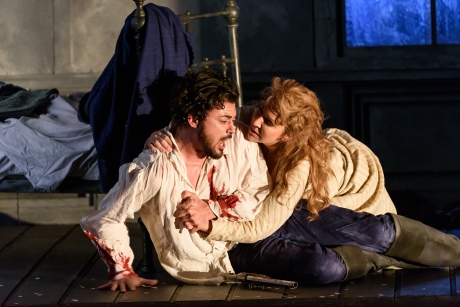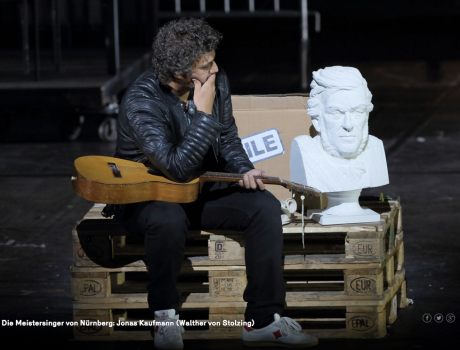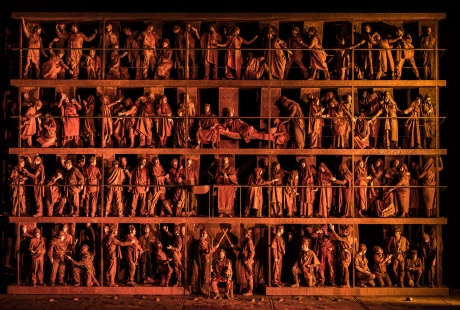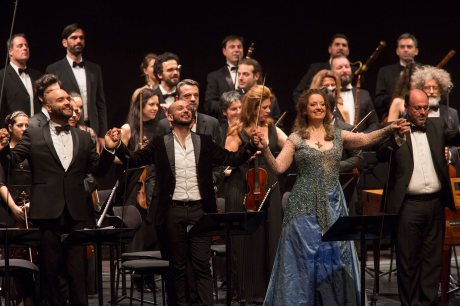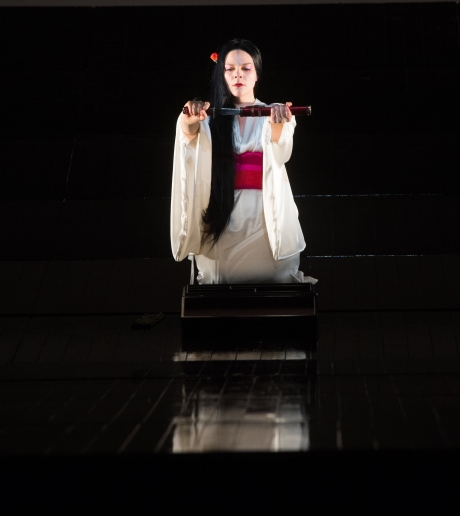The most obvious fil rouge connecting the several sections of this concert, belonging to the “extra festival” part of the Maggio Musicale Fiorentino, was its “Viennesity”. The Habsburg capital is synonym with waltz, which, before exploding in the second part of the program devoted to Strauss Jr. was already budding in the minuet of the third movement of the famous, monumental Symphony No. 96 in D major by F. J. Haydn, where absolute prominence is given to the oboe, which plays the obbligato in the Mozart aria “Vorrei spiegarvi, oh Dio” K. 418. This aria was the artistic peak of the whole concert, thanks to Diana Damrau who, with this immaculate performance of an old favourites of her, managed to make the writer forget some of her recent questionable explorations of the nineteenth century Italian repertoire; Mozart gives her the opportunity to display what currently seems to be the sharpest arrow in her quiver: a formidable control of soft slow singing, “sul fiato”, hold together by a most pure legato carefully dosed, a product of a floating, unconstricted vocal production which kept – almost osmotically – the audience holding their breaths, thus unawarely imitating the singer and her mastery of breath control. Such untenable tension, to which the oboe – instrument of seduction par excellence – contributed by giving birth to a downright love duet with the soprano, suddenly broke when the adagio flowed into the allegro, like an abrupt return to reality, which Damrau interpreted with dramatic urgency, perfectly conveying the text “partite, correte, fuggite”; in the next phrase she was able to communicate Clorinda’s regret mixed to sarcasm, when she orders the Count to think about his beloved Emilia, and in the final più allegro she perfectly nailed the feared huge jump of two octave minus one minor third from B 3 to D 6. Within such a masterful performance one is easily inclined to close one eye on the slightly shrilly Es 6, which she did not quite manage to hit twice as the score prescribes, a fearsome passage that gave her no problems whatsoever a few years ago. The oboist Alberto Negroni had earlier been singled out for applause by Zubin Mehta for his contribution in the Haydn Symphony.

Firenze, giugno 2016. Un momento del concerto all’Opera di Firenze con ZUBIN MEHTA ed il soprano DIANA DAMRAU insieme all’Orchestra del Maggio Musicale Fiorentino. Florence, June 2016. A moment at the Opera di Firenze theatre during the concert with Zubin Mehta and the soprano Diana Damrau with the Orchestra of the Maggio Musicale Fiorentino.
“Vorrei spiegarvi, oh Dio” had been preceded by “A Berenice…Sol nascente”, K. 70, composed by a pre-adolescent Mozart, an aria that Damrau performed with diligent professionalism, almost a warm-up to the glorious rendition of the K. 418 that was to come. The second part of the programme catapulted us to the “Austria Felix” of one century later, so that amidst such a triumph of waltzes, polkas and csárdás one had the the impression to be attending a New Year’s Eve concert. Zubin Mehta, who had previously chosen magically hypnotic tempos in the first part of K. 418, proved once more to have a natural affinity towards this repertoire, with an ebullient and vigorous approach, perfectly followed by the Orchestra del Maggio Musicale Fiorentino which – it never hurts to repeat it – is one of the best in Italy thanks to its cleanness, roundness and richness, as well as its capacity to express itself as a whole living organism.
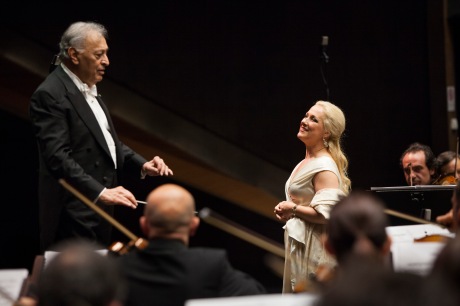
Firenze, giugno 2016. Un momento del concerto all’Opera di Firenze con ZUBIN MEHTA ed il soprano DIANA DAMRAU insieme all’Orchestra del Maggio Musicale Fiorentino. Florence, June 2016. A moment at the Opera di Firenze theatre during the concert with Zubin Mehta and the soprano Diana Damrau with the Orchestra of the Maggio Musicale Fiorentino.
Here Diana Damrau stood out particularly for her huge expressive communication, the ability to find the right gesture and gaze for each selection, for each word of the texts. Vocal technique is something that a singer can (or better, should) refine with rigorous schooling, but charisma is innate: either you have it or you don’t. Arias such as “Frühlingsstimmen” by Johan Strauß Jr, and the “Csárdás” from Die Fledermaus by the same composer suited her better in the first part of her career, when her timbre was fresher and more crystal-like, and her top more insouciant (this time for instance she omitted the variations to the A flat 6 in “Frühlingsstimmen”). Let it be clear that this is a comparison between the Damrau of today and the one of the beginnings: this Florentine performance reached quality levels precluded to most of her colleagues in this repertoire.

Firenze, giugno 2016. Un momento del concerto all’Opera di Firenze con ZUBIN MEHTA ed il soprano DIANA DAMRAU insieme all’Orchestra del Maggio Musicale Fiorentino. Florence, June 2016. A moment at the Opera di Firenze theatre during the concert with Zubin Mehta and the soprano Diana Damrau with the Orchestra of the Maggio Musicale Fiorentino.
A curious “incident” took place when during the encores the soprano announced, using its Italian title, an aria from La vedova allegra (The Merry Widow), while the orchestra attacked “Meine Lippen, sie küssen so heiss” from Giuditta: no big deal, the composer was the same. In conclusion, this was a high quality concert that conquered the audience for its vocal prowesses and festive atmosphere, dominated by a primadonna that donned three different extremely elegant “mise”: black and pearly grey in Mozart, aptly lily white in “Frühlingsstimmen” (Spring Voices), and flame red in the fiery “Hungarian” aria. At the end of the concert Zubin Mehta thanked the veteran cellist Fabiana Arrighini, as this performance marked her retirement. Everyone who is everyone was in attendance, joining a wildly enthusiastic audience packed to the rafters.
Nicola Lischi
Photo credit: Simone Donati – TerraProject – Contrasto
